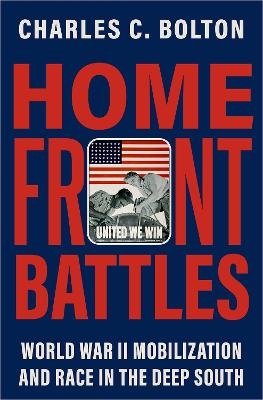
Home Front Battles
Oxford University Press Inc (Verlag)
978-0-19-765561-0 (ISBN)
Home Front Battles examines the many effects of World War II economic and military mobilization on the Deep South, including the federal government's attempts to solve some of the social problems that arose from a massive influx of migrants who were unfamiliar with a new world of work. It also underscores one of the primary home front battles, which began with the passage of the Selective Training and Service Act in 1940 and the creation of the Fair Employment Practices Committee in 1941, banning discriminatory military training and employment practices and making it clear that the federal government would be promoting the ideal of nondiscrimination as part of its wartime mobilization efforts. In the Deep South, where race relations were already tense, these directives and southern tradition clashed.
White politicians-ranging from the liberal Georgia governor Ellis Arnall to Theodore Bilbo, the reactionary U.S. senator from Mississippi-disagreed about the long-term impact of wartime mobilization. At the same time, the fight for African American rights culminated with the elections of 1946, when Blacks in the Deep South tried to vote on a scale unprecedented in the twentieth century and white Southerners closed ranks to beat back their efforts-using tactics that ranged from social intimidation to outright violence.
Charles C. Bolton is Professor of History and former Associate Dean of the College of Arts and Sciences at the University of North Carolina-Greensboro, where he has also served as Head of the Department of History. He previously taught at the University of Southern Mississippi, where he served as chair of the Department of History and director of the Center for Oral History and Cultural Heritage. Bolton is also the recipient of major grants from the Mississippi Humanities Council, NASA, and the U.S. Department of Education. He is the author of many books on Southern history, including Poor Whites of the Antebellum South, The Hardest Deal of All: The Battle over School Integration in Mississippi, 1870-1980, and William F. Winter and the New Mississippi.
Introduction
Part I: Economic Mobilization
Chapter 1: World War II and Agriculture in the Deep South
Chapter 2: Ingalls Shipyard: Pascagoula, Mississippi
Chapter 3: The FEPC and Black Workers
Chapter 4: "A Typical Crowded War Community": Pascagoula, Mississippi
Part II: Military Mobilization
Chapter 5: Military Mobilization and Black Troops
Chapter 6: The 364th Infantry Regiment, Camp Van Dorn, and the Crisis of 1943
Chapter 7: A Conservative Revolution
Part III: Southern Politics
Chapter 8: Ellis Arnall: Southern Liberal
Chapter 9: Theodore Bilbo: Southern Reactionary
Chapter 10: Political Crossroads, 1946: Black Voters and White Resistance
Epilogue
Notes
Bibliography
Acknowledgements
| Erscheinungsdatum | 04.10.2023 |
|---|---|
| Zusatzinfo | 10, b/w |
| Verlagsort | New York |
| Sprache | englisch |
| Maße | 168 x 249 mm |
| Gewicht | 680 g |
| Themenwelt | Sachbuch/Ratgeber ► Geschichte / Politik ► Regional- / Landesgeschichte |
| Geschichte ► Allgemeine Geschichte ► 1918 bis 1945 | |
| Geisteswissenschaften ► Geschichte ► Regional- / Ländergeschichte | |
| Geschichte ► Teilgebiete der Geschichte ► Kulturgeschichte | |
| Geschichte ► Teilgebiete der Geschichte ► Militärgeschichte | |
| Sozialwissenschaften ► Soziologie | |
| ISBN-10 | 0-19-765561-0 / 0197655610 |
| ISBN-13 | 978-0-19-765561-0 / 9780197655610 |
| Zustand | Neuware |
| Haben Sie eine Frage zum Produkt? |
aus dem Bereich


